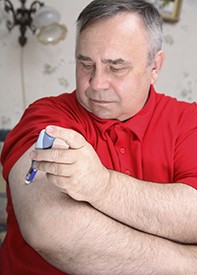Peer Reviewed
Perspectives
Role of testosterone in men with type 2 diabetes
Abstract
Older, obese men with type 2 diabetes commonly present with nonspecific symptoms consistent with androgen deficiency and modestly reduced testosterone levels. Lifestyle measures, especially weight loss and optimisation of diabetes control and comorbidities such as sleep apnoea, can increase and sometimes even normalise testosterone levels in such men. Recent randomised clinical trials of testosterone therapy in men with diabetes and low testosterone levels without organic hypogonadism have failed to show a consistent benefit in symptoms or glycaemic control.
Key Points
- Measurement of testosterone levels in men with type 2 diabetes should not be performed routinely, but instead be targeted to men in whom significant androgen deficiency is suspected clinically.
- Men with unequivocally low testosterone levels should be evaluated for an underlying pathological cause. It should not be assumed that hypogonadism is a consequence of type 2 diabetes.
- First-line management in the older, obese man with type 2 diabetes and low-normal testosterone levels should be the optimisation of lifestyle measures and glycaemic control, using established antidiabetic medications.
Picture credit: © Vikulin/iStockphoto. Model used for illustrative purposes only.
Purchase the PDF version of this article
Already a subscriber? Login here.

